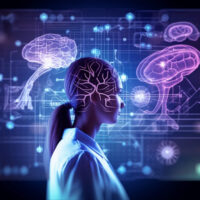Nowadays, there is a growing interest in the utilization of artificial intelligence (AI) in therapy and mental healthcare, both from the perspectives of therapists and clients. AI therapy using chatbots has gained significant attention as an alternative to traditional therapy, particularly after the pandemic, as individuals seek solutions for their mental health issues. This raises the question: “Will AI support clinicians or replace them?”
Let’s explore more of AI therapy (or artificial intelligence therapy).
Article structure:
What is AI therapy
AI therapy is a software powered by machine learning that can analyze patients’ emotions and learn human behavior through audio, text, and video conversations.
A conversational machine learning software that engages in dialogue with users to monitor and track their emotional well-being. Therapist AI provide therapeutic support that enhances human therapy sessions by generating personalized reminders and coping mechanisms for mental health.
Interaction takes place through various communication channels such as mobile apps, SMS, web browsers, and video conferencing systems, utilizing Natural Language Processing (NLP). Patient communication data is used to dynamically adapt the conversational interface, tailoring it to each patient’s unique mental health situation. Recent advancements also explore the use of NLP for proactive mental healthcare and early diagnosis.
As an ever-present online app or system, AI therapeutic support is available anytime, providing answers to questions and offering feedback. AI therapy offers on-demand mental health assistance, daily mood tracking, and visualized data charts to help users navigate their mental states.
Who can benefit from AI therapy
AI Therapy offers a valuable solution for individuals seeking to enhance their mental well-being. It proves particularly advantageous for those lacking access to traditional therapy services or desiring a more discreet and automated approach. Moreover, it presents a cost-effective alternative to live therapy sessions with mental health professionals. AI Therapy also serves as a complementary resource for individuals seeking additional support in-between their regular therapy visits.
AI Therapy caters to those in search of an alternative to traditional in-person cognitive behavioral therapy (CBT) or individuals seeking the convenience and privacy of therapy from the comfort of their own homes. It can prove highly beneficial for individuals facing challenges in attending regular appointments due to scheduling conflicts, geographical limitations, or mental health conditions such as social anxiety.
How does AI therapy work
AI therapy operates through sophisticated algorithms and natural language processing to analyze conversations, recognize patterns in thoughts and behaviors, and offer tailored guidance and recommendations. By tracking your progress over time, therapist AI deliver insightful feedback and individualized interventions that empower you to achieve your goals. With AI therapy, you receive personalized support and guidance to enhance your mental well-being.
Disadvantages of the AI therapy
Critics argue that there are potential pitfalls and risks associated with chatbot therapy. One concern is the limited ability of machines to accurately perceive and respond to the wide range of human emotions, raising doubts about their effectiveness. The cancellation of a recent experiment involving chatbot-assisted therapeutic messages sparked controversy and highlighted the challenges of relying solely on AI for mental health support.
Algorithms have yet to reach a stage where they can replicate the complexities of human emotion, let alone provide empathetic care. There is a risk that individuals, particularly teenagers, who try AI-driven therapy and find it lacking may dismiss other mental health interventions, believing they have already exhausted their options.
On the other hand, proponents of chatbot therapy argue that it may be the only practical and affordable solution to address the global demand for mental health care. With a shortage of professionals, chatbot therapy can offer reminders, such as encouraging meditation, or provide apps that facilitate journaling, helping users track their progress and boost their confidence.
Good to know: Inflection AI personal chatbot Pi: What is heypi and how can it be used
Advantages of integrating AI chatbots in therapy
There are several notable benefits associated with the utilization of chatbots in therapy:
- Improved Accessibility. AI-based therapies offer increased accessibility, particularly for individuals residing in remote areas or facing mobility constraints. The ability to access therapy remotely enhances convenience and reduces barriers to receiving mental health support.
- Reduced Stigma. Some individuals may find it easier to discuss sensitive topics with an AI chatbot compared to a human therapist, as there is no fear of judgment or social stigma. This can foster a sense of comfort and openness in sharing personal experiences and concerns.
- Consistency of Care. AI-based therapies deliver consistent and standardized care, ensuring that individuals receive a reliable level of support. This can be beneficial for individuals who struggle to establish a connection with human therapists or have encountered negative experiences in traditional therapy settings.
However, it is crucial to recognize that AI-based therapies should not be viewed as a substitute for human therapy. They can serve as a valuable complement to traditional therapeutic approaches but should not replace the role of human therapists entirely. Careful consideration of ethical implications, potential risks, and limitations is necessary when integrating AI into therapy practices.
Examples of AI therapy
AI therapy has revolutionized the mental health landscape, offering accessible and personalized support to individuals in need. Let’s explore some notable examples of AI therapy and the unique benefits they provide.
Wysa, another AI chatbot, caters to individuals seeking mental health support. Powered by the innovative PEARL algorithm, Wysa tailors conversations to users’ responses and goals. It goes beyond chat interactions and provides guided meditations, personalized coping strategies, and even integrates with Apple HealthKit to offer comprehensive well-being information.
AI-Therapy combines AI technology with evidence-based psychotherapy techniques. It offers interactive exercises and activities to help users manage their mental health, along with progress tracking and intervention effectiveness measurement tools.
Woebot, a widely recognized AI chatbot, offers round-the-clock assistance for those facing mental health challenges like depression and anxiety. By harnessing natural language processing algorithms, Woebot delivers personalized advice and insights to help individuals manage their emotions effectively. Employing cognitive-behavioral therapy techniques, Woebot encourages healthier thoughts and behaviors.
Ginger.io connects individuals with therapists, coaches, and professionals to make mental healthcare accessible. Through natural language processing and machine learning, it detects behavioral and emotional changes, providing timely interventions and support.
AIMed, developed by King’s College London, provides automated CBT interventions tailored to individual needs. It assists people with depression and anxiety in effectively managing their symptoms using AI technology.
Through the power of AI, these examples of automated therapy bring convenience, accessibility, and personalization to mental health support. They serve as a testament to the potential of AI in transforming the way we approach and engage with therapy, making mental well-being more attainable for everyone.



